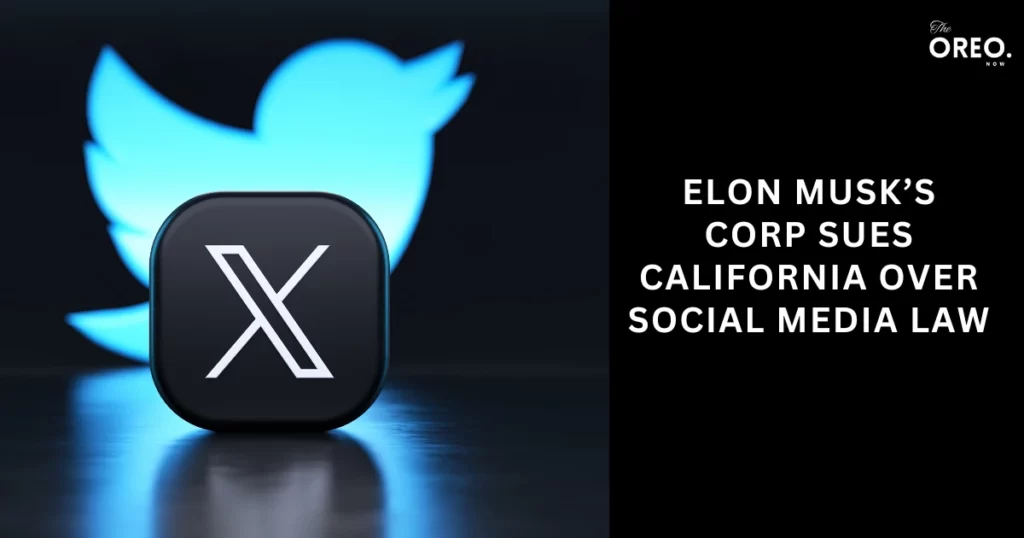Elon Musk’s X is suing California over Assembly Bill 587
Elon Musk’s X Corp has sued California over Assembly Bill 587, a state law that creates additional transparency requirements for social media businesses. The law mandates that social media businesses make their rules for monitoring extremism, harassment, hate speech, and disinformation public.
According to X Corp, the First Amendment of the US Constitution protects its right to free speech and the statute infringes on that freedom. According to the business, the rule is overly ambiguous and provides the government excessive authority to control what is posted on social media. The rule, according to X Corp, will hinder innovation in the social media sector.
Elon Musk has previously sued California, so this is not the first time. He filed a lawsuit against the state in 2022 over legislation requiring Tesla to report information on collisions using its Autopilot driver-assistance technology.
Additionally, Musk has criticized California’s environmental restrictions, claiming that they are excessively onerous on businesses.
The legal battle against California is anticipated to be protracted and expensive. Although it is unknown how the courts will rule, the case may have a big impact on how free expression will be protected in the future on social media.
Tesla is defending itself against a number of other cases in California in addition to the one regarding the transparency statute. A class action complaint contends that the corporation misrepresented the estimated driving ranges of its electric vehicles.
Another case was filed by Tesla car owners who were upset with “phantom braking” in their automobiles.
In recent years, tensions have grown between California and Tesla. The state has looked into Tesla for a number of things, including labour discrimination and safety. Additionally, Tesla has criticized California’s environmental laws.
What is Assembly Bill 587?
On September 13, 2022, California Assembly Bill 587—also known as the “Social Media Platforms Content Moderation Transparency Act”—became law. Social media sites with annual gross revenues of at least $100 million are required by law to:
- Post their content moderation guidelines and enforcement methods online.
- Report information on the amount of content removals and the causes of those removals every six months.
- Give users a way to get in touch with you if they have any questions about the policies and processes.
The goal of the regulation is to improve the openness and accountability of content moderation on social media sites. Additionally, it is meant to make users more aware of how these platforms handle their content.
The law has received a variety of responses. Some people are in favour of the law, stating that social media companies ought to be held responsible for the content that is hosted on their platforms. Others disagree with the rule, claiming that it infringes on social media platforms’ and their users’ First Amendment rights.
Several social media sites, including Twitter, Meta (previously Facebook), and Google, are actively contesting the law in court. Although it’s uncertain how the courts will interpret the law, the outcome is likely to have a big impact on how social media content monitoring is done in the future.
Here are some of the specific requirements of AB 587:
- Social media platforms must post their content moderation policies and enforcement procedures on their websites in a clear and concise manner.
- The policies must be written in plain language that is understandable to the average user.
- The policies must include information on the following topics:
- What types of content are prohibited on the platform?
- How does the platform define these prohibited types of content?
- How does the platform enforce its content moderation policies?
- What are the appeals process for users who believe that their content has been wrongfully removed?
- Social media platforms must semiannually report data on the number of content removals and the reasons for those removals.
- The reports must be submitted to the California Attorney General and made publicly available.
- The reports must include information on the following topics:
- The number of pieces of content that were removed from the platform.
- The reasons why they removed the content.
- The number of appeals that were filed and the outcomes of those appeals.
- Social media platforms must provide contact information for users to ask questions about the policies and procedures.
- The contact information must be posted on the platform’s website and in its terms of service.
A complicated statute with broad ramifications is AB 587. It is still to be seen how the law will be applied and upheld, as well as how it will impact how social media platforms function.

Whether Elon Musk will gain from the lawsuit opposing California’s Assembly Bill 587 is difficult to say for sure. The arguments made by both sides, the evidence produced, and the court’s decisions will all have a role in how the case turns out.
Musk may be able to benefit in some ways from the situation, though. For instance, if the court decides that AB 587 is unconstitutional under the First Amendment, the decision may create a precedent that makes it more challenging for other states to enact comparable legislation. Social media platforms might have more freedom to control material as a result.
Furthermore, if the case takes a long time, it might divert California’s attention from other problems and make it more challenging for the state to control social media companies. Musk might also profit from this since it would allow him more time to make his own modifications to Twitter.
It’s conceivable that the conflict between California and X Corp will last for some time. The political and cultural gap between the two states is reflected in it. Texas is a conservative state with a more laissez-faire attitude toward business, whereas California is a liberal state with a robust regulatory framework.
Of course, Musk could potentially run into danger. If the court rejects his appeal, it might establish a precedent that makes it simpler for states to impose social media platform regulations. This might restrict Musk’s capacity to manage Twitter content.
Must Read: Stay Organized and Connected with Google’s New Android Productivity Features



